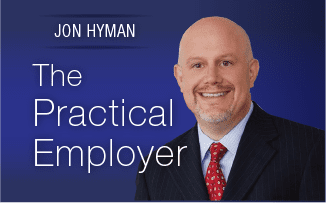When I’m not lawyering, I’m speaking in public. And one of the topics on which I’ve been focusing of late is the balance between an employee’s privacy and an employer’s right to know.
One of the themes of this talk is that social media has irreparably blurred the line between one’s personal persona and one’s professional persona, and that employees best be careful with what they say online, because employers are watching and holding them accountable.
Case in point? Buker v. Howard County, which concerns a fire department battalion chief, Kevin Buker, fired because of a series of posts (his spelling and punctuation, not mine) to his personal Facebook page.
“My aide had an outstanding idea … lets all kill someone with a liberal … then maybe we can get them outlawed too! Think of the satisfaction of beating a liberal to death with another liberal …its almost poetic …”
And …
“To prevent future butthurt and comply with a directive from my supervisor, a recent post (meant entirley in jest) has been deleted. So has the complaining party. If I offend you, feel free to delete me. Or converse with me. I’m not scared or ashamed of my opinions or political leaning, or religion. I’m happy to discuss any 8 of them with you. If you’re not man enough to do so, let me know, so I can delete you. That is all. Semper Fi! Carry On.”
And …
“Unfortunately, not in the current political climate. Howard County, Maryland, and the Federal Government are all Liberal Democrat held at this point in time. Free speech only applies to the liberals, and then only if it is in line with the liberal socialist agenda. County Governement recently published a Social media policy, which the Department then published it’s own. It is suitably vague enough that any post is likely to result in disciplinary action, up to and including termination of employment, to include this one. All it took was one liberal to complain . . . sad day. To lose the First Ammendment rights I fought to ensure, unlike the WIDE majority of the Government I serve.”
Additionally, Buker “liked” a photo, posted by a co-worker, of an elderly woman with her middle finger raised, captioned: “THIS PAGE, YEAH THE ONE YOU’RE LOOKING AT IT’S MINE[.] I’LL POST WHATEVER THE F**K I WANT[.]”
Finally, he “liked” a racist comment by a co-worker to his “beating a liberal to death” post, which suggested that Buker “pick a black one.”
Based on the totality of these posts, the department fired Buker.
The court had little problem affirming the lower court’s decision dismissing Buker’s claims.
“For several reasons, we conclude that the Department’s interest in efficiency and preventing disruption outweighed Plaintiff’s interest in speaking in the manner he did regarding gun control and the Department’s social media policy. First, Plaintiff’s Facebook activity interfered with and impaired Department operations and discipline as well as working relationships within the Department. … Second, Plaintiff’s Facebook activity significantly conflicted with Plaintiff’s responsibilities as a battalion chief. … Third, Plaintiff’s speech frustrated the Department’s public safety mission and threatened ‘community trust’ in the Department, which is ‘vitally important’ to its function. … Fourth, Plaintiff’s speech — particularly his ‘like’ of the image depicting a woman raising her middle finger — ‘expressly disrespect[ed] [his] superiors.’ Lastly, we observe that the record is rife with observations of how Plaintiff’s Facebook activity … disregarded and upset the chain of command upon which the Department relies. In sum, we conclude the Department’s interest in workplace efficiency and preventing disruption outweighed the public interest commentary contained in Plaintiff’s Facebook activity.”
Let me put it another, more practical, way. Many employees have not yet realized that anything they say online can impact their professional persona, and that every negative or offensive statement could lead to discipline or termination.
Until people fully understand that social media has erased the line between the personal and the professional, these issues will continue to arise. It is our job as employers to educate our employees about living in this new online world, because it is clear that not all employees have yet learned this lesson.
And, until they do, employees will keep getting fired for what they post on social media (even on their personal profiles during non-working time).
And I will keep speaking and writing about it.
Jon Hyman is a partner at Meyers, Roman, Friedberg & Lewis in Cleveland. Comment below or email editors@clomedia.com. Follow Hyman’s blog at Workforce.com/PracticalEmployer.











